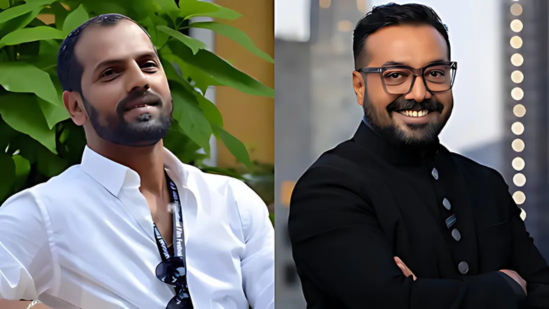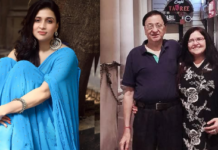
Filmmaker Laxman Utekar has made headlines with a bold statement aimed at director Anurag Kashyap. In a recent interview, Utekar said that nobody is stopping Kashyap from leaving Bollywood, and added that “Unki sensibility nahi hai,” meaning Kashyap’s creative style does not match with today’s film industry. This statement has sparked a major discussion in the entertainment world, with fans and insiders taking sides.
Anurag Kashyap, known for his dark, raw, and intense cinema, has often spoken about feeling disconnected from the current Bollywood trends. He has voiced his frustration over commercial pressures, changing audience tastes, and the industry’s increasing focus on mainstream, high-budget entertainers. Recently, he even hinted that he might move away from Bollywood if things don’t change. But Laxman Utekar’s sharp reply has taken this conversation to another level.
Utekar, who is known for successful films like “Luka Chuppi” and “Zara Hatke Zara Bachke,” said in a candid chat, “No one is forcing him to stay. If his sensibility doesn’t match, he’s free to go.” He added that the film industry is large and flexible, and that different kinds of content are being made. “If audiences are watching what we create, then it clearly works,” he said, referring to mass-market entertainers that often perform well at the box office.
His statement is seen as a direct response to Kashyap’s repeated criticism of commercial cinema and filmmakers who focus on box office success rather than creative storytelling. Kashyap has often said that today’s industry lacks depth, and that formula-driven films are killing the soul of Indian cinema.
But Utekar disagrees. He believes that every filmmaker has their own audience and that mainstream cinema also requires skill and vision. He argued that Bollywood is not rejecting art, but adapting to what people want. “If Anurag feels disconnected, maybe it’s because his way of storytelling isn’t connecting with the masses anymore,” Utekar remarked.
This comment has created a buzz on social media, with fans divided. While some supported Utekar’s frankness, others came out in defense of Kashyap, calling him one of the few directors who still believe in cinema as a form of art, not just business. Hashtags like #LaxmanUtekar, #AnuragKashyap, #BollywoodDebate, and #CinemaVsCommerce started trending within hours.
It’s not the first time that the creative vs commercial cinema debate has surfaced in Bollywood. But this time, the clash feels personal. Both Utekar and Kashyap represent very different ends of the spectrum. While Utekar has found success by blending romance, drama, and family-friendly themes, Kashyap built his reputation with gritty, offbeat films like “Gangs of Wasseypur”, “Black Friday”, and “Ugly”.
Kashyap has also been vocal about the lack of support for independent filmmakers, saying that OTT platforms have become their only safe space. But even there, he feels limited due to censorship and changing business models. In contrast, Utekar seems comfortable with both the theatre experience and digital platforms, making films that appeal to wider audiences.
The conflict between vision and business, between art and profit, has always existed in cinema — not just in India, but worldwide. But in India, this line seems more visible now than ever before. With the rise of pan-India films, high-octane action dramas, and star-driven blockbusters, niche cinema often struggles to find space.
Still, Utekar insists that the choice lies with the filmmaker. “If you believe in your style, stick to it. But don’t blame the audience or the system if things don’t work,” he said, clearly hinting at Kashyap’s recent comments. He also reminded that even in today’s world, good content can succeed, if presented the right way. “Look at ‘12th Fail’, look at ‘Article 15’, look at the success of small films on OTT — the space is there if the content is strong,” he added.
Anurag Kashyap, on the other hand, believes that the Bollywood system does not nurture risk-takers anymore. He has accused studios of ignoring bold stories and depending too much on franchise films and remakes. “Where is the space for a new voice?” he asked in a recent event.
This growing divide reflects a larger issue — What kind of cinema does India really want? Do audiences prefer deep, thought-provoking narratives? Or do they go to the theatres mainly for entertainment and escape?
Laxman Utekar’s point is simple: if the audience is happy, then the filmmakers are doing their job. “We are not making movies in isolation. People are watching them, enjoying them, paying for them. That’s the real success,” he said.
Meanwhile, Kashyap has not yet publicly replied to Utekar’s statement, but fans expect a comeback soon, especially since Kashyap is known for his unfiltered responses. Some believe this may even lead to a public debate or panel discussion between the two, which could bring more clarity to the issues troubling Indian cinema today.
Interestingly, both directors are products of the same industry, yet their journeys show how different paths and philosophies can lead to entirely opposite views. One thrives in structure, the other in rebellion. One adapts, the other resists. And both are necessary to keep Bollywood balanced.
As the industry evolves, the battle between creativity and commerce continues. And perhaps, voices like Utekar’s and Kashyap’s are essential to push boundaries, raise questions, and challenge each other — even if it leads to friction.
In the end, the real decision-makers are the audiences. They vote with their tickets, their views, and their shares. Whether it’s a Utekar romantic drama or a Kashyap crime thriller, the power to choose lies with the people.


































